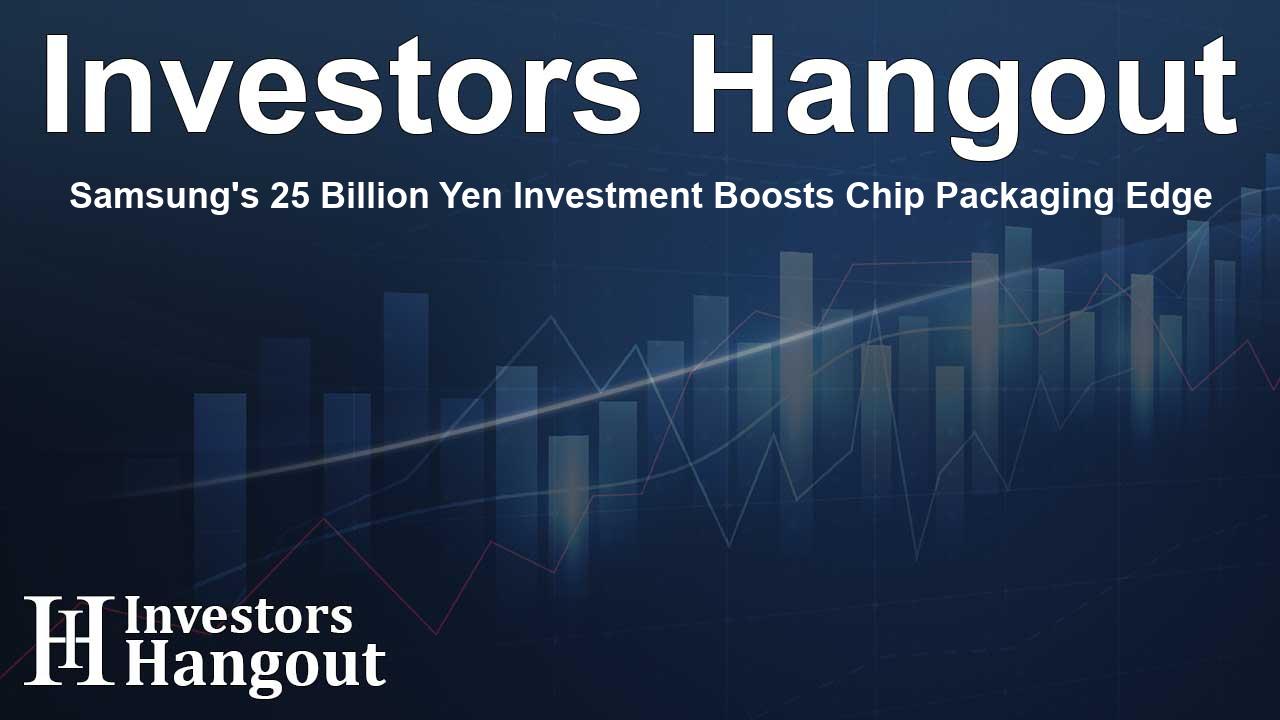Samsung's 25 Billion Yen Investment Boosts Chip Packaging Edge

Samsung's Significant Investment in Japan
Samsung Electronics has recently unveiled plans to invest 25 billion yen, approximately $170 million, to establish an advanced chip packaging research and development center in Japan. This strategic move is largely aimed at enhancing its position in the competitive landscape of chip packaging, where it currently trails behind strong competitors such as Taiwan Semiconductor Manufacturing Co.
Projected Growth of the Chip Packaging Market
The global advanced chip packaging market is expected to witness substantial growth, projected to expand from $34.5 billion in 2023 to an impressive $80 billion by 2032. This growth trajectory signals a lucrative opportunity for Samsung as it seeks to enhance its market share and technological capabilities in this critical sector.
Collaborations to Boost Research and Development
With the opening of this new lab scheduled for March 2027, Samsung aims to strengthen its collaboration with several prestigious partners, including Japanese semiconductor material suppliers and institutions. Notable companies involved are Disco, Namics, and Rasonac, as well as the University of Tokyo, all of whom will play integral roles in advancing Samsung’s chip packaging technologies.
Government Support for the Project
The City of Yokohama has pledged a subsidy of 2.5 billion yen for this initiative. The R&D center will occupy the Leaf Minato Mirai building, which is being transformed from a former retail space into a state-of-the-art research facility and pilot production line.
Samsung's Growth in the Semiconductor Sector
Samsung's acquisition of the 47,710-square-meter facility is expected to enhance its advanced packaging capabilities significantly. The intention is to recruit specialized researchers from the University of Tokyo, further reinforcing its commitment to leading-edge technology development in chip packaging.
Current Market Shares and Competitive Landscape
Comparatively, Taiwan Semiconductor dominates the market with a commanding 35.3% share. In contrast, Samsung currently holds a smaller 5.9% share. The competitive landscape remains fierce, as Samsung recently secured a $16.5 billion foundry contract for Tesla's AI6 chips, which signals its commitment to expanding its influence and capabilities in the semiconductor space.
The Significance of the Tesla Contract
This contract with Tesla, a major player in the automotive and AI markets, has been highlighted by industry experts as a valuable opportunity for both companies. Ming-Chi Kuo, a well-known analyst, pointed out that this partnership provides Tesla with essential real-world foundry experience, enhancing their chip design capabilities and giving them leverage for future negotiations.
Samsung's Production Capabilities Compared to Competitors
Although currently trailing Taiwan Semiconductor regarding production efficiency—with Samsung achieving a 2nm yield of only 40-45%—industry analysts believe that the potential for advancement is significant. Tesla's ability to shift production back to Taiwan Semiconductor if necessary minimizes their risk.
Future Developments in Chip Manufacturing
Furthermore, Taiwan Semiconductor is forging ahead with plans to expand into new fabrication plants. They are set to begin groundbreaking on four new facilities soon, aiming to commence mass production of 2nm chips by the late 2028 timeframe. This expansion illustrates the rapid growth and transformation occurring within the semiconductor industry as key players work to outpace one another.
With these developments, the upcoming Fab 25 is expected to include several 1.4nm wafer lines, with ambitious output targets of 50,000 wafers per month anticipated to revolutionize chip manufacturing efficiency.
Frequently Asked Questions
What is Samsung's recent investment in Japan about?
Samsung plans to invest 25 billion yen to establish a chip packaging R&D center in Yokohama, Japan, to strengthen its competitive edge.
What is the projected growth of the advanced chip packaging market?
The market is expected to grow from $34.5 billion in 2023 to $80 billion by 2032, indicating significant opportunities for growth.
Who are Samsung's partners in this initiative?
Samsung is collaborating with companies such as Disco, Namics, Rasonac, and the University of Tokyo to enhance its R&D capabilities.
What financial support is Samsung receiving for this project?
The City of Yokohama is providing a subsidy of 2.5 billion yen to assist with the establishment of the facility.
How does Samsung's market share compare to Taiwan Semiconductor?
Samsung currently holds a 5.9% market share, compared to Taiwan Semiconductor's dominant 35.3% share in the semiconductor market.
About The Author
Contact Caleb Price privately here. Or send an email with ATTN: Caleb Price as the subject to contact@investorshangout.com.
About Investors Hangout
Investors Hangout is a leading online stock forum for financial discussion and learning, offering a wide range of free tools and resources. It draws in traders of all levels, who exchange market knowledge, investigate trading tactics, and keep an eye on industry developments in real time. Featuring financial articles, stock message boards, quotes, charts, company profiles, and live news updates. Through cooperative learning and a wealth of informational resources, it helps users from novices creating their first portfolios to experts honing their techniques. Join Investors Hangout today: https://investorshangout.com/
The content of this article is based on factual, publicly available information and does not represent legal, financial, or investment advice. Investors Hangout does not offer financial advice, and the author is not a licensed financial advisor. Consult a qualified advisor before making any financial or investment decisions based on this article. This article should not be considered advice to purchase, sell, or hold any securities or other investments. If any of the material provided here is inaccurate, please contact us for corrections.
